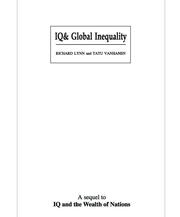Check nearby libraries
Buy this book

We address the following questions. First, in Chapter 1, we review the major theories of economic growth that have been developed since this problem was considered by Charles de Montesquieu and Adam Smith in the eighteenth century and introduce the 192 countries of this study. In Chapter 2 we define and describe what is meant by intelligence. In Chapter 3, we summarize work showing that intelligence is a determinant of incomes and related phenomena (educational attainment and socio-economic status) among individuals in a number of countries; this is the basis of our theory that the intelligence of national populations is likely to be a determinant of per capita incomes among nations. Chapter 4 describes how we have collected and quantified the IQs of nations and presents new IQ data for a further 32 nations. This brings the total number of nations for which we have measured IQs to 113. In addition, national IQs are estimated for 79 other countries so that we have IQs for all countries with populations of more than 40,000. In Chapter 5, five measures of the quality of human conditions and their composite index (QHC) are introduced as well as 12 alternative variables that measure human conditions from different perspectives. In Chapter 6, the hypothesis on the positive relationship between national IQ and the quality of human conditions is tested by empirical evidence on PPP GNI (Gross National Income at Purchasing Power Parity) per capita in 2002, adult literacy rate in 2002, tertiary enrollment ratio, life expectancy at birth in 2002, and the level of democratization in 2002. Chapter 7 focuses on the relationship between national IQ and the composite index of the quality of human conditions (QHC) The results are analysed at the level of single countries on the basis of regression analyses. The results are checked by exploring the impact of latitude and annual mean temperature on human conditions through national IQ. Chapter 8 shows that national IQ is correlated also with many other variables that measure differences in human conditions from different perspectives. Twelve alternative variables are used in these analyses. Chapter 9 discusses the contributions of genetic and environmental determinants to national differences in intelligence and concludes that the racial identity of the population is the major factor. Chapter 10 considers the causal interactions between our most important measures. Chapter 11 (Criticisms and Rejoinders) discusses and responds to the criticisms made of our theory by reviewers. Finally, we summarize the results and conclusions of this study in Chapter 12 and discuss policy implications. Five appendices complement the text. In Appendix 1, the calculation of national IQs for 113 countries is presented and documented. Appendix 2 includes documented empirical data on the adult literacy rate in 2002, the gross enrollment ratio at the tertiary level of education, PPP GNI per capita in US dollars in 1002, and the life expectancy at birth in 2002 for the total group of 192 countries. Appendix 3 provides documented data on the measures of democracy, of the calculated values of the Index of the Quality of Human Conditions (QHC), and of latitude and annual mean temperature. Appendix 4 includes residuals of regression analyses of the five components of QHC on national IQ for single countries in the group of 192 countries. Appendix 5 provides estimated data on per capita GDP derived from Maddison (2003) for 1500 and 2000 in a group of 109 countries. - Publisher.
Check nearby libraries
Buy this book

Showing 2 featured editions. View all 2 editions?
| Edition | Availability |
|---|---|
|
1
IQ and Global Inequality
November 10, 2006, Washington Summit Publishers
Hardcover
in English
- 1st edition
1593680252 9781593680251
|
aaaa
Libraries near you:
WorldCat
|
|
2
IQ and Global Inequality
November 10, 2006, Washington Summit Publishers
Perfect Paperback
in English
- 1st edition
1593680244 9781593680244
|
zzzz
Libraries near you:
WorldCat
|
Book Details
The Physical Object
ID Numbers
Community Reviews (0)
Feedback?History
- Created December 15, 2009
- 6 revisions
Wikipedia citation
×CloseCopy and paste this code into your Wikipedia page. Need help?
| August 10, 2010 | Edited by IdentifierBot | added LibraryThing ID |
| April 24, 2010 | Edited by Open Library Bot | Fixed duplicate goodreads IDs. |
| April 16, 2010 | Edited by bgimpertBot | Added goodreads ID. |
| April 14, 2010 | Edited by Open Library Bot | Linked existing covers to the edition. |
| December 15, 2009 | Edited by WorkBot | link works |










